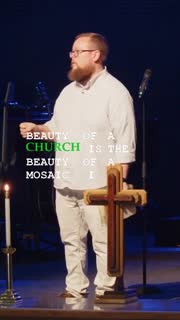Seeking Wisdom: The Path from Knowledge to Action
Devotional
Sermon Summary
Bible Study Guide
Sermon Clips
1. "Part of how we gain wisdom is by seeking the Lord's understanding on things. And the best way to do that is sometimes to test it against our brothers and sisters in Christ. So we encourage you to be a part of that." [18:53] (11 seconds)
2. "Wisdom is really the definition that I use, the working definition. The definition that I use is wisdom is knowledge applied correctly. And there are many times we get stuck where we have all the knowledge, but we don't know how to apply it correctly." [23:03] (18 seconds)
3. "Christian wisdom is the application of knowledge that makes the world a better place, not just for you, but for everyone around you." [24:31] (9 seconds)
4. "The beginning of wisdom is acknowledging that we don't know everything about everything. I can tell you that my kids have endless questions. And you know what is a fine answer? I don't know. Or why don't you go Google that and tell me what you find out?" [31:54] (20 seconds)
5. "When you ask God to give you something, God very normally gives you more than you thought would happen. Solomon gets given this gift of wisdom and the wisdom literature in the Bible. Most of it is ascribed to Solomon, the book of Proverbs." [36:22] (19 seconds)
6. "The beauty of a church is the beauty of a mosaic. I don't know if y'all ever seen a beautiful mosaic where people take all those broken pieces of glass and they work them together into becoming something beautiful, but even stained glass." [42:26] (12 seconds)
7. "We are wiser together than we are on our own. We are better together than we are on our own. Part of why I like being United Methodist is we have found new and creative ways to complicate being together." [44:04] (15 seconds)
8. "As followers of Christ, we're called to make space for God's wisdom to speak in our lives. We're called to allow God to lead us. God is wiser than we are. I know that none of you want to hear that, but you're not as smart as God." [50:09] (15 seconds)
9. "It's not enough to just know what the Bible says. You have to know how to use it. You have to know how to use it to be the kind of disciple that goes out into the world and transforms it into more of what God would have it be." [50:09] (14 seconds)
10. "Seek the places where God is calling you to be still and listen. Find the people that will help guide you in the right direction and be willing to listen. Don't be stubborn and hard-hearted and think you know everything. Be willing to listen." [50:09] (19 seconds)
Ask a question about this sermon
2. "Wisdom is really the definition that I use, the working definition. The definition that I use is wisdom is knowledge applied correctly. And there are many times we get stuck where we have all the knowledge, but we don't know how to apply it correctly." [23:03] (18 seconds)
3. "Christian wisdom is the application of knowledge that makes the world a better place, not just for you, but for everyone around you." [24:31] (9 seconds)
4. "The beginning of wisdom is acknowledging that we don't know everything about everything. I can tell you that my kids have endless questions. And you know what is a fine answer? I don't know. Or why don't you go Google that and tell me what you find out?" [31:54] (20 seconds)
5. "When you ask God to give you something, God very normally gives you more than you thought would happen. Solomon gets given this gift of wisdom and the wisdom literature in the Bible. Most of it is ascribed to Solomon, the book of Proverbs." [36:22] (19 seconds)
6. "The beauty of a church is the beauty of a mosaic. I don't know if y'all ever seen a beautiful mosaic where people take all those broken pieces of glass and they work them together into becoming something beautiful, but even stained glass." [42:26] (12 seconds)
7. "We are wiser together than we are on our own. We are better together than we are on our own. Part of why I like being United Methodist is we have found new and creative ways to complicate being together." [44:04] (15 seconds)
8. "As followers of Christ, we're called to make space for God's wisdom to speak in our lives. We're called to allow God to lead us. God is wiser than we are. I know that none of you want to hear that, but you're not as smart as God." [50:09] (15 seconds)
9. "It's not enough to just know what the Bible says. You have to know how to use it. You have to know how to use it to be the kind of disciple that goes out into the world and transforms it into more of what God would have it be." [50:09] (14 seconds)
10. "Seek the places where God is calling you to be still and listen. Find the people that will help guide you in the right direction and be willing to listen. Don't be stubborn and hard-hearted and think you know everything. Be willing to listen." [50:09] (19 seconds)










